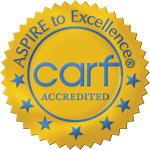Getting help in the form of professional treatment is the next step for someone who thinks they have a substance use problem. But that next step can be confusing for those who are unfamiliar with the different types of addiction treatment that are available. What’s the difference between residential, outpatient, and other kinds of professional help for addiction? Which one might be right for you or your loved one?
If you’ve been following the Stepworks Connect blog, you know that we’ve been talking about what you can do if you have a loved one suffering from drug or alcohol dependence. We began by looking at why it’s important to address a potential drug problem, and in another post we discussed some strategies and practical tips for talking to a loved one about addiction.
In this post we’ll pick up from where we left off: what if your loved one accepts that they have a problem in need of treatment? The next step is to seek out help. Familiarizing yourself with the different types of addiction treatment can help you and your loved one think about what kind of treatment to seek.
Detoxification
Drug or alcohol detox can be one component of a wider treatment program, or it can be a standalone service offered through hospital, clinics, or rehab facilities. Detox is a necessary component of treatment for most people who are actively using drugs or alcohol. Detox refers to a professionally monitored period of cessation from drug use until the chemical substances are no longer in the user’s body. It can be important for this to occur within a professionally monitored environment, because some types of drug withdrawal cause painful symptoms. In extreme cases, drug withdrawal can have life-threatening physiological consequences.
In addition to ensuring that your loved one is safe through the withdrawal period, professional detox services can help them experience withdrawal with less physical discomfort. This is usually achieved by selective use of medications to soften the physical symptoms of withdrawal. It’s not uncommon for people to revert to drug use after experiencing withdrawal symptoms. For that reason, seeking professional detox can help your loved one stay the course through a potentially uncomfortable period.
Outpatient Addiction Treatment
Outpatient addiction treatment programs vary in the services that they offer. They’re defined by being either one-time or repeated appointments during which the program takes place. In other words, the client doesn’t stay at the place of treatment.
One common kind of outpatient treatment, used frequently for heroin or opioid addiction, is medication-assisted treatment through clinics using methadone or buprenorphine. These programs typically administer a medication that controls cravings and blocks the effects of opioids on a regular basis, often requiring the client to pass drug tests in order to stay in the program. Many of these programs also offer some form of addiction education or counseling in addition to supervising the client’s medication use.
Individual or family counseling for addiction can also come under the category of outpatient treatment. Counseling or therapy is an essential aspect of addiction treatment for a variety of reasons. Working through previous trauma, hidden anger, depression, or other factors of a substance use problem can help your loved one understand some of the reasons for their compulsive behaviors and understand how to change them. Family therapy can be helpful for repairing the damage to treasured relationships that addiction often causes.
Peer Support and Self-Help Programs
Most people have heard of Alcoholics Anonymous, but there’s also NA and Celebrate Recovery, plus many more non-affiliated support groups. Connecting with other people who are battling a substance use problem can help keep one accountable for their recovery. As many people who have struggled with addiction will tell you, it’s absolutely essential to be able to talk about a problem with people who have been through a similar experience. Are these self-help groups the only way to do that? No, but they have the benefit of being widespread and available in most places. Because they work on a voluntary basis from week to week, they might not be the most effective way to recover from addiction. However, support groups and accountability are tremendously important for long-term recovery as part of an aftercare plan of disease management.
Residential Addiction Treatment Programs
Of the various types of addiction treatment, residential treatment programs offer the most intensive and comprehensive level of intervention and treatment. (They’re also known as rehab or inpatient treatment.) Residential treatment programs might be relatively short, as in 30-day programs, or they can extend to being as long as a year, or even longer with sober-living homes. The advantage of residential treatment is that it involves an intensive and holistic approach to changing the person’s relationship with addictive substances. Addictions can be deep seated, requiring extensive education, counseling, and behavioral practices to produce lasting changes.
Residential treatment programs should incorporate the services outlined above, bringing them together into a multi-angled approach to treatment. Many programs start with detox if the client requires it before allowing them to begin other aspects of the program. Therapeutic counseling, both individually and in groups, will also be an important component in good treatment programs. In addition, some residential treatment programs offer exposure to self-help philosophies and peer-support models like those mentioned above.
Residential programs are often recommended because they allow someone to radically change their day-to-day lifestyle, which up to the point of starting treatment has been trapped in a cycle of compulsive drug seeking. They allow clients to re-evaluate the direction of their life and stake out a point of change. Plus, they can more effectively educate clients about the science of addiction and physical dependency as well as strategies for changing one’s behavior.
Choosing one of the types of addiction treatment
Now that you have a basic lay of the land, how can you decide which of the types of addiction treatment is right for your loved one? The best way to do this is to seek a professional addiction assessment. Many addiction treatment companies, like Stepworks, offer assessment services as a first step toward finding the right kind of treatment. Other options might include speaking with a personal physician or counselor about one’s treatment needs. The most important thing is to reach out for help. Once your loved one is on a path to recovery, much of the confusion they might be feeling can be replaced with a newfound hope for positive change.
Looking for more resources for your addicted loved one? We can help. Just fill out the form below to get more information from a Stepworks team member.
Family Member Contact Form
Contact form for those who think that they may have a family member or loved one suffering from addiction.



